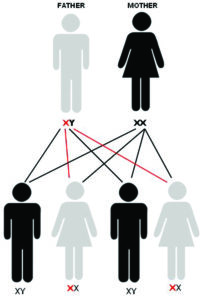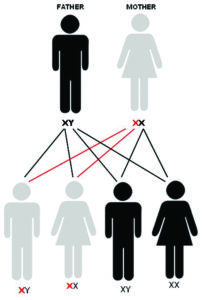Haemophilia is an inherited condition. However, it is possible for the condition to appear in any family. It is thought that at least 30% of people with haemophilia have no family history of a bleeding disorder. It is difficult to be exact about this because of the way in which haemophilia is inherited. Technically, it has a “sex-linked recessive inheritance pattern. This means that while generally only males are affected by the condition, it is passed on through the female member of the family. When the father has haemophilia, but the mother does not, none of their sons will have haemophilia. However, all of their daughters will be obligate carriers, carrying the haemophilia gene. The sons will not be affected by haemophilia, nor will they be carriers.
Father with haemophilia
The daughter of a man with haemophilia is an obligatory carrier since she has received an \’X\’ chromosome from her father. This means that each of her sons will have a 50% chance of having haemophilia. A carrier has one normal and one defective \’X\’ chromosome.
Figure 1: When the father has haemophilia and the mother is unaffected. None of the sons will have haemophilia. All of the daughters will carry the haemophilia gene.
Mother with haemophilia
The daughter of a female carrier also has a 50:50 chance of being a carrier herself. Because of the ability for the defective gene to remain hidden through several generations of carrier daughters, it can be difficult to know whether there really is a family history, or whether the problem has just been dormant for several generations.
Figure 2: When the mother carries the haemophilia gene and the father is unaffected. There is a 50% chance at each birth that a son will have haemophilia. There is a 50% chance at each birth that a daughter will carry the haemophilia gene.
The vast majority of persons with haemophilia are male. It is, however, possible for a girl to have haemophilia. Many carriers would be categorised as having mild haemophilia. (Carriers with low factor levels with less than 50% factor deficiency, are classed as a person with mild haemophilia). However, it is possible due to lyonisation of the \’X\’ chromosome for a carrier to have severe haemophilia. It is also possible for a girl to have severe haemophilia if her father is a person with haemophilia and her mother is a carrier.
If you would like to talk to somebody about the inheritance of haemophilia, please contact the office and any of the staff will be able to assist you.


